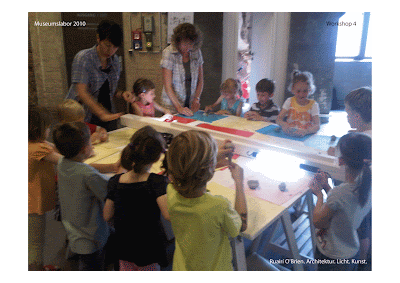Workshop 4:
Konfrontation / Confrontation.
Museumslabor
Report IV
09.06.2010
Children from the Kita "Fröbel"
and One Elderly Citizen.

Children drawing their shadows on the Museum wall !

The fourth workshop took place under the title "Confrontation". It was planned to work with two groups one group at the very beginning of their life journey, small children from a local kindergarten and the other group elder citizens who had begun their lifes during the 2nd world war or shortly afterwards. (unfortunately only one elderly citizen came, but nevertheless the circle of life was represented and fulfilled through her participation for which i am grateful). This was a confrontation of time and if you like destiny. Museums are confronted with the mapping of passing time, destruction, conservation, memories lost and found on an everyday basis. The beauty and sadness of coming and going is especially poignant in a city like Dresden that suffered so much destruction due to world war II. The beauty of Dresden lost, the treasures of Dresden lost confronts us in every small childs innocent smile. The children confront us with their innocence and ask us "why" with their every move. I asked them to draw their "shadows" on the museums white wall. I have included a small film fragment where I ask the children which painting is winter. The children do not know yet that they are the promise of "Spring" for us all, for mankind. It is both a warning and a hope.
Winter always comes...for us all...
I took a walk with the children through the exhibition and we talked about the exhibits, afterwards back in the "Museumslabor" I showed them the exhibits that were selected by the other children during the first workshop for the project. I asked them to create out of their memories of what they had seen some clay objects for the growing collection. Here are some examples. Small children are used to working with plastercine in kindergarten's, clay is more difficult, teachers say..however children work with what they have, this free and archaic unquestioning approach to life is often lost through too much emphasis on adult precieved results. The children see perfect in imperfect because they are somewhat free of the concept of failure, it is only through their interaction with adults that this "finished product" this surface "perfect" thinking becomes important. Of course children learn from us and we can not avoid this responsibility, however we can learn also from children to cherish what we have lost, the ability to be imperfect, unfinished and free.

"Simple things"

 "Confrontation"
"Confrontation"
Generations working in the "Museumslabor" "Spring-Summer-Autumn-Winter"
Collections also have their "Springtime" the process of growth and development can be observed in the "objects" collected and of course not collected. Decisions made to follow one or the other course can influence the spirit or the intention of a museum collection. Museum collections like the growth rings in a tree can tell us a larger story outside of the "object" about who collected what and why. In the trunk of a tree we can read when the tree grew, good and bad times, ugly times, hard times, water shortage, desease, parasitical attacks leave their marks in the rings produced. During certain periods of our history, our museum collections were manipulated to reflect the political "Zeitgeist", today in reflection we can see these manipulations, we are "confronted" with these "objects that were deemed to be of importance and we are "confronted" with the "gaps" the "objects" that were not "collected" and "preserved". Truth and memory is a universal "confrontation" for "man" in all his "eternal seasons".
 Children drawing their shadows on the Museum wall !
Children drawing their shadows on the Museum wall !




Keine Kommentare:
Kommentar veröffentlichen